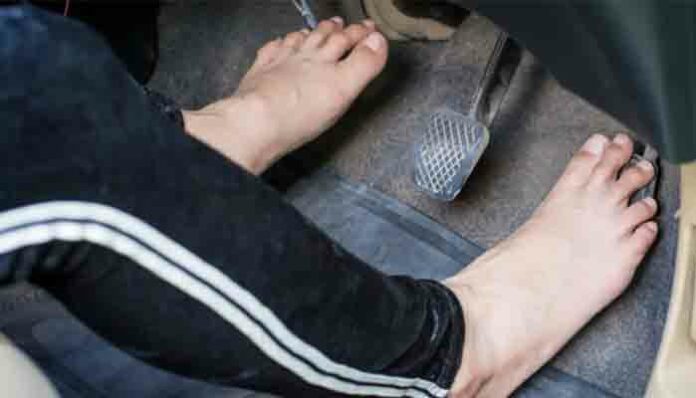Introduction
Legal Perspective on Driving Barefoot
Contrary to popular belief, Is It Illegal to Drive Barefoot? is often asked, but in most jurisdictions, there are no specific laws that prohibit it. While some states may have regulations regarding footwear, these typically focus on ensuring that drivers wear proper footwear rather than explicitly banning barefoot driving. However, it’s essential to check local laws and regulations, as they can vary from one region to another.
Safety Concerns Associated with Driving Barefoot
Although driving barefoot is generally legal, it’s crucial to acknowledge the potential safety hazards it may pose. One concern is the lack of proper grip on the pedals, which could affect one’s ability to control the vehicle, especially in emergency situations. Additionally, bare feet may be more susceptible to slipping, especially if the pedals are wet or slippery.
Debunking Myths about Driving Barefoot
There are several myths surrounding the topic, including the common question, Is It Illegal to Drive Barefoot? Many people believe it’s against the law or that it increases the risk of accidents. However, studies have shown that driving barefoot does not significantly impair one’s ability to operate a vehicle safely. In fact, some argue that it may even improve tactile feedback and enhance the overall driving experience.
Benefits of Driving Barefoot
Driving barefoot can offer certain benefits, such as increased comfort and better sensory feedback. Many people find that they have more control over the pedals and can better feel the nuances of the road without the barrier of shoes. Additionally, driving barefoot can be particularly enjoyable during warmer months when shoes may feel restrictive.
Precautions for Driving Barefoot
While driving barefoot is generally safe, it’s essential to take precautions to ensure one’s safety. This includes keeping feet clean and dry to prevent slipping, maintaining proper foot positioning on the pedals, and being mindful of any discomfort or pain that may arise. If driving barefoot feels uncomfortable or unsafe, it’s advisable to wear appropriate footwear.
Case Studies and Legal Precedents
There have been cases where individuals involved in accidents while driving barefoot raised the question, Is It Illegal to Drive Barefoot? However, in most instances, the absence of footwear was not deemed a significant contributing factor to the accident. Legal precedents suggest that driving barefoot is not inherently negligent or illegal unless it directly contributes to the incident.
Public Opinion and Cultural Perspectives
Public opinion on the question Is It Illegal to Drive Barefoot? varies widely depending on cultural norms and personal preferences. While some view the practice as unconventional or unsafe, others see it as a matter of personal choice and comfort. Cultural perspectives also play a role, with some societies viewing bare feet as more acceptable in everyday contexts, including driving.
Expert Opinions and Recommendations
Driving instructors and experts generally agree that driving barefoot is safe, though it often leads people to ask, Is It Illegal to Drive Barefoot? As long as it does not impair one’s ability to operate the vehicle safely, it is typically considered acceptable. Experts recommend practicing good driving habits, maintaining proper foot positioning, and being aware of any discomfort or limitations while driving barefoot. Ultimately, the decision to drive barefoot should be based on individual comfort and safety considerations.
Comparative Analysis with Other Driving Practices
Driving barefoot is just one of many unconventional driving practices that people engage in, often raising the question, Is It Illegal to Drive Barefoot? Compared to other practices such as driving in flip-flops or high heels, driving barefoot may actually pose fewer risks. However, it’s essential to weigh the pros and cons of each practice and prioritize safety above all else.
Regulations in Different Countries
While many people wonder, Is It Illegal to Drive Barefoot? the answer varies depending on the country. While driving barefoot is generally accepted in most places, there may be variations in regulations and cultural attitudes. Some countries may have stricter laws regarding footwear while driving, while others take a more relaxed approach. It’s essential to familiarize oneself with local laws and customs when driving in different countries.
Educational Campaigns and Awareness Programs
There are initiatives aimed at educating drivers about safe driving practices, including addressing common questions such as Is It Illegal to Drive Barefoot? These campaigns emphasize the importance of maintaining proper control of the vehicle and being aware of potential hazards on the road. By increasing awareness and understanding, these programs aim to promote safer driving habits for all motorists.
Conclusion
FAQs
1, Is it illegal to drive barefoot in all states?
No, driving barefoot is not explicitly illegal in most states, but it’s essential to check local laws and regulations.
2, Are there any specific safety concerns associated with driving barefoot?
While driving barefoot is generally safe, concerns include lack of grip on pedals and susceptibility to slipping, especially in wet conditions.
3, Can driving barefoot affect insurance claims in case of accidents?
Unless driving barefoot directly contributes to the accident, it’s unlikely to affect insurance claims significantly.
4, Are there any medical conditions that make driving barefoot unsafe?
Individuals with certain foot conditions or injuries may find driving barefoot uncomfortable or unsafe and should consult a medical professional.
5, How can I ensure my comfort and safety while driving barefoot?
To ensure comfort and safety, keep feet clean and dry, maintain proper foot positioning on pedals, and be aware of any discomfort or limitations.

